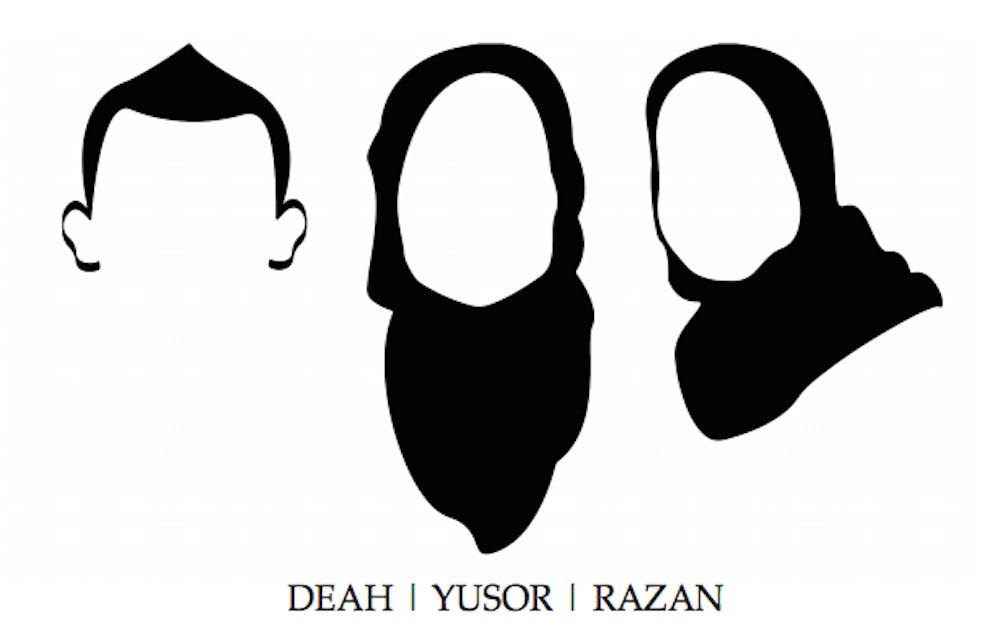The shooter, Craig Stephen Hicks, was charged with killing the three on Feb. 10, 2015. The case was not designated a hate crime. His trial date has not been assigned. If convicted, Hicks could receive the death penalty.
UNC Chancellor Carol Folt said the sorrow she felt three years ago is unforgettable.
“I am so grateful for everyone in our local communities, and our students at the School of Dentistry, who dedicate public service work to commemorate the lives of three inspiring human beings who left us far too soon,” she said in a statement given to The Daily Tar Heel.
Khan said the best way to preserve the three's legacy is to follow in their footsteps.
“How we respond to tragedies like that — that’s what defines us,” he said.
The Our Three Winners Foundation was created in honor of those killed, aiming to continue their legacy of humanitarianism and philanthropy.
On Jan. 31, Chapel Hill Mayor Pam Hemminger declared Feb. 10 as Our Three Winners Day. Last week, U.S. Rep. David Price, D-N.C., issued a statement on the House floor honoring Our Three Winners. On the anniversary of their deaths on Saturday, Price and Mohammed Abu-Salha, Yusor and Razan’s father, held a press conference.
Religious tolerance on campus
Mona Sajjad, a Muslim senior majoring in exercise and sports science, said she has seen progress in the acceptance of Muslims on campus since 2015. She said she does not feel unsafe or unwelcome on campus, and the response to the 2015 killings made her prouder to be a Muslim.
“Being a part of the Muslim Students Association, it has helped me get through my college years,” she said. “I wouldn’t be the person I am today without MSA and without the people I met through it.”
MSA is helping to organize an interfaith food drive in honor of the 2015 victims and is collecting non-perishable donations until Feb. 24.
Sajjad and Tejan-Sie said the UNC administration handled the response to the killings well. Tejan-Sie said one of his proudest moments of MSA was its work with Folt to quickly organize a vigil for the victims.
To get the day's news and headlines in your inbox each morning, sign up for our email newsletters.
Khan said he was impressed by how accommodating UNC was in honoring the legacy of Our Three Winners but thinks there could have been a larger response.
“There needs to be more voices — especially by elected officials and people in positions of power — to speak up,” he said. “I did not see enough outcry or expression of anger that this is unacceptable. We may have political differences or different ideologies, but hate and bigotry cannot be tolerated.”
A young, black, Muslim male in America, Tejan-Sie said neither his skin color nor his religion take precedence in defining his identity. He said because he is not as visibly Muslim as his sister, who wears a hijab, he worries she experiences Islamophobia more than he does.
“Internally, my faith defines a lot of my actions, but externally, my skin color determines a lot of people’s reactions to how they see me,” he said. “Both are central to my life and experiences.”
Tejan-Sie said he hopes UNC will become more assertive in its goals of tolerance.
“I hope that the University takes steps to possibly remind their student body every year that Islamophobia is a relevant issue,” he said. “That just because the areas we live in may be outwardly progressive, those strains of hatred and xenophobia, they might still be present.”
Moving forward, Sajjad said she is optimistic for tolerance at UNC, but she knows more could be done to foster inclusivity and diversity.
“I always feel like there could be more,” she said. “The University always preaches diversity, and I just feel like we could do more to show that instead of just putting a person of color on a board or something like that.”
@LucasRisinger
state@dailytarheel.com



